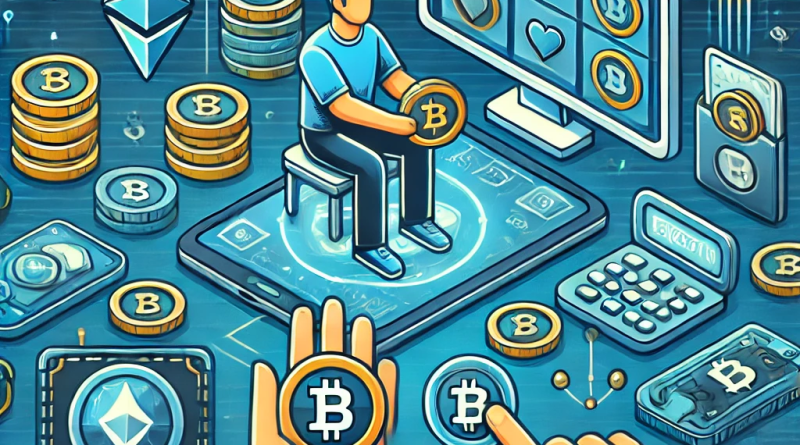6 Steps For Creating Your First P2E Game
Creating a game that rewards players with a specific crypto token involves several steps, including developing the game itself, integrating blockchain technology, and setting up smart contracts for token distribution. Below is a high-level overview of how to approach this project.
1. Define the Game Concept
- Game Design: Outline the gameplay mechanics, rules, objectives, and how players will earn rewards.
- Target Platform: Decide if the game will be for web, mobile, or desktop.
2. Choose the Blockchain and Token
- Blockchain Platform: Select a blockchain platform (e.g., Ethereum, Binance Smart Chain, Polygon) based on factors like transaction fees, speed, and community support.
- Token Standard: Decide on the token standard (e.g., ERC-20 for fungible tokens, ERC-721 for non-fungible tokens) and create or use an existing token.
3. Develop the Game
- Game Development: Use a game engine (e.g., Unity, Unreal Engine) to develop the game. For web-based games, you can use HTML5 and JavaScript frameworks like Phaser.
- Backend Server: Set up a backend server to handle game logic, player data, and interactions with the blockchain.
4. Integrate Blockchain
- Smart Contracts: Write smart contracts to manage the distribution of rewards. These contracts will handle the issuance and transfer of tokens.
- Example: Solidity for Ethereum-based smart contracts.
- Wallet Integration: Integrate crypto wallets (e.g., MetaMask) into your game to allow players to interact with the blockchain.
- Web3.js/Ethers.js: Use Web3.js or Ethers.js to interact with the blockchain from your game’s frontend.
5. Security and Testing
- Audit Smart Contracts: Ensure your smart contracts are secure and free of vulnerabilities. Consider third-party audits.
- Test Thoroughly: Test the game and smart contracts extensively in a test environment before going live.
6. Deploy and Launch
- Deploy Smart Contracts: Deploy your smart contracts to the chosen blockchain network.
- Launch Game: Deploy the game on your chosen platform and ensure everything is working smoothly.
Example Code: Smart Contract in Solidity
Here’s a simple example of a Solidity smart contract that rewards players with a custom ERC-20 token:
// SPDX-License-Identifier: MIT
pragma solidity ^0.8.0;
import "@openzeppelin/contracts/token/ERC20/ERC20.sol";
import "@openzeppelin/contracts/access/Ownable.sol";
contract GameToken is ERC20, Ownable {
constructor(uint256 initialSupply) ERC20("GameToken", "GTK") {
_mint(msg.sender, initialSupply);
}
function rewardPlayer(address player, uint256 amount) public onlyOwner {
_transfer(owner(), player, amount);
}
}
Integrating Web3.js with Your Game
Here’s an example of how to integrate Web3.js in a web-based game to reward players with tokens:
// Include Web3.js library
const Web3 = require('web3');
const web3 = new Web3(Web3.givenProvider || "ws://localhost:8545");
// Smart contract ABI and address
const abi = /* ABI generated by the compiler */;
const contractAddress = "0xYourContractAddress";
const contract = new web3.eth.Contract(abi, contractAddress);
// Function to reward player
async function rewardPlayer(playerAddress, amount) {
const accounts = await web3.eth.getAccounts();
const senderAddress = accounts[0];
contract.methods.rewardPlayer(playerAddress, amount).send({ from: senderAddress })
.on('transactionHash', function(hash) {
console.log('Transaction sent:', hash);
})
.on('confirmation', function(confirmationNumber, receipt) {
console.log('Transaction confirmed:', confirmationNumber, receipt);
})
.on('error', console.error);
}
// Call rewardPlayer when a player earns a reward
rewardPlayer('0xPlayerAddress', 100); // Example callAdditional Considerations
- User Experience: Ensure that the process of connecting wallets and receiving tokens is smooth and user-friendly.
- Compliance: Be aware of legal considerations regarding token distribution and ensure compliance with relevant regulations.
- Scalability: Plan for scalability, especially if you anticipate a large number of transactions.
By following these steps and leveraging the example code, you can develop a game that rewards players with a specific crypto token.
blockchain development, blockchain gaming, blockchain technology, crowdsourced funding, crypto economy, crypto ecosystem, crypto integration, crypto rewards, crypto wallets, decentralized finance, decentralized gaming, defi, digital assets, erc-20 tokens, ethereum games, game development, game finance, gamefi, gamification, gaming tokens, in-game transactions, nft rewards, play-to-earn, player incentives, reward mechanics, secure smart contracts, smart contracts, solidity programming, token distribution, tokenomics, virtual currency, web3 integration

